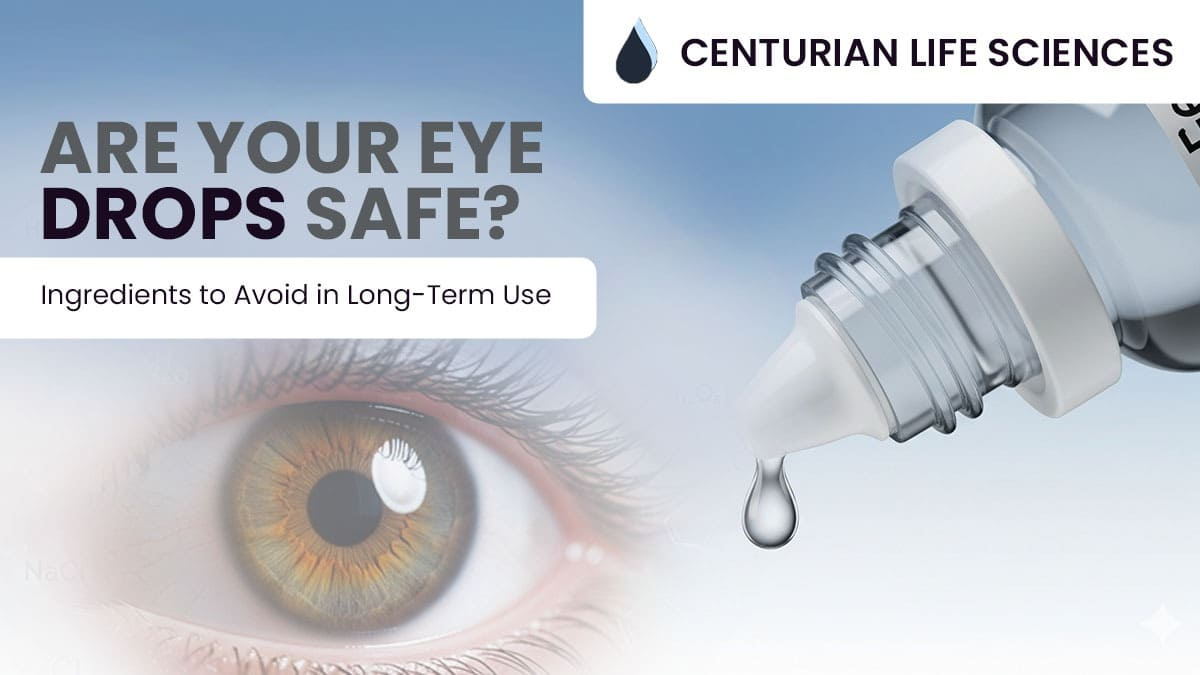
Are Your Eye Drops Safe? Ingredients to Avoid in Long-Term Use
When caring for your eyes, eye drops are typically our first choice for solutions. Whether you have dry eyes, redness, allergies or healing from surgery, there are eye drops for almost every condition. But, we ask you a serious question: Are your eye drops safe for long term use?
Most of us use them without reading the ingredients label. But, like any medication, certain ingredients in eye drops can cause harm and can actually be counterproductive when used continuously for a prolonged period of time. In this blog, we will help you answer the question, Are your eye drops safe, and what should you be avoiding in eye drops made for long term use?
Why It Matters: Are Your Eye Drops Safe?
Your eyes are delicate organs and anything that comes in direct contact with your eyes must be scrutinized. Eye drops may give you fast relief, however some formulations may worsen symptoms, become addictive, and/or cause long term negative damage to the eye with prolonged use.
This is why it is important to ask yourself often: Are your eye drops safe for regular use?
Common Eye Drop Types
Before we get into the harmful ingredients, let’s quickly go through the most common types of eye drops:
- Lubricating drops (Artificial Tears) – Used for dry eyes
- Anti-redness drops – Used to reduce visible blood vessels
- Antibiotic eye drops – Used for bacterial infections
- Anti-allergy drops – Used to relieve itching and irritation
- Steroid drops – Used to reduce inflammation
Now let’s explore what to avoid.
Harmful Ingredients in Eye Drops for Long-Term Use
1. Benzalkonium Chloride (BAK)
This is one of the most common preservatives in eye drops. It is effective at preventing contamination, but BAK can be toxic to the eye surface upon repeated long-term use. Consequences of long-term BAK use may include
- Irritation to the eyes
- Redness
- Destruction to corneal cells
If you are asking yourself are your eye drops safe, and they contain BAK, the answer could be no for daily use.
2. Tetrahydrozoline / Naphazoline
These vasoconstrictors are commonly found in “redness relief” eye drops. The problem is that these agents reduce blood vessel size and make your eye appear whiter for a short time, but over time will also cause a “rebound effect,” and potentially worsen the redness.
If you are using drops frequently that contain tetrahydrozoline, it may be time to ask yourself – Are your eye drops safe for long term health?
3. Corticosteroids (Steroids)
Steroid drops are often prescribed for inflammation or to assist with healing post surgery. However, if used for long periods without breaks, this can lead to a rise in intraocular pressure or the development of glaucoma or cataracts. These drops should only be used with caution and under a doctor’s supervision.
If you have been using steroidal drops continuously – without breaks – you should seriously be questioning for clarity, are your eye drops safe for long-term health?
4. Antibiotics (Without Prescription)
Examples of antibiotic eye drops include chloramphenicol or tobramycin, to name just a few. Taking these medications without a definitive diagnosis can potentially cause, among others, resistance, allergy, or even toxicity. Do not self-prescribe antibiotic drops.
As a general rule: are the eye drops you are using prescribed by an eye care professional? If not, the eye drops you are using are probably not safe to use.
5. Preservatives in General
Even the milder preservatives to prolong shelf life of the drops can cause irritation given their daily use. If you use drops more than 4 times daily, it is time to consider preservative free, single dose vials when possible.
If you are still using preserved multi-dose bottles daily, I think it is time to ask the very same question: Are your eye drops safe?
How to Choose Safe Eye Drops
So how do you choose drops that are both effective and safe for the long term? Here are some simple steps:
- Check the label – Avoid drops that contain BAK, vasoconstrictors, or steroids unless prescribed.
- Choose preservative-free – Especially, if you will need to use your drops more than once daily.
- Check expiry dates – Expired drops may be contaminated or ineffective.
- Consult an eye doctor – always better to have personalized recommendations.
If you’ve ever asked, are your eye drops safe, these guidelines are your answer.
Best Eye Drops in India: What to Look For
When looking for the best eye drops in India, make sure to check for:
- Preservative-free formulation
- Clinically tested ingredients
- Recommendations from ophthalmologists
- Transparent labeling
Several companies in India offer excellent eye care products, but the best eye drops in India come from trusted pharma brands that focus on safety and innovation.
Choose Quality: Backed by the Best Pharma Company in India
At Centurian Life Sciences, we understand that people care deeply about the safety of the products they use. That’s why our products are developed under strict quality control standards with a focus on long-term eye health.
As a proud contender for the Best pharma company in India, Centurian Life Sciences has always prioritized:
- Advanced research
- Transparent formulation
- Doctor-approved products
- GMP-certified manufacturing
Our commitment to eye safety makes our products stand out when you ask: Are your eye drops safe?
Tips for Long-Term Eye Drop Users
If you need to use eye drops regularly, here’s how to stay safe:
- Use only preservative-free drops for chronic dry eye
- Avoid redness-relieving drops with vasoconstrictors
- Limit steroid or antibiotic use unless advised
- Take regular breaks if possible
- Don’t share your drops with others
Safety starts with awareness. The more you know about what you’re using, the better your eye health will be.
Conclusion: Are Your Eye Drops Safe?
In the race to soothe our eyes, we often forget to question the contents of the products we trust. So pause for a moment and ask yourself once again: Are your eye drops safe?
Read labels. Avoid harmful ingredients. Trust only reputed brands like Centurian Life Sciences, which is known for providing some of the best eye drops in India, developed by one of the best pharma companies in India.
Your eyes are precious—give them the care they truly deserve.

